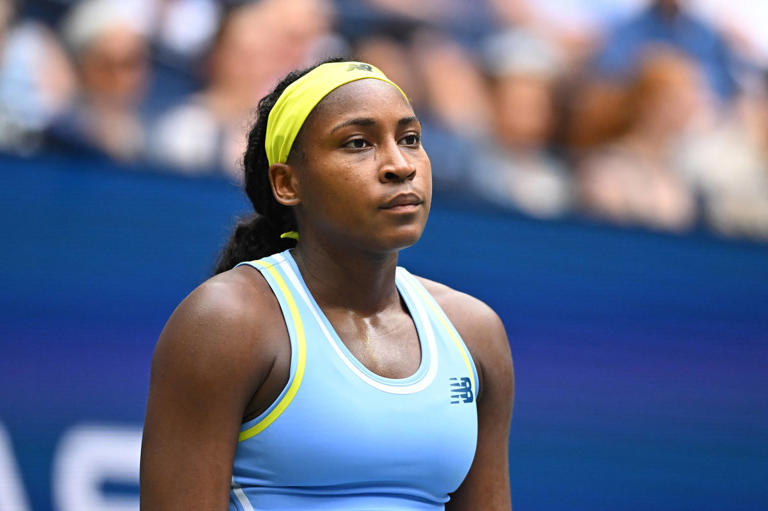The world of tennis recently witnessed a seismic moment when Coco Gauff, the young tennis phenom, clinched a lucrative $4.8 million title at an exhibition event held in Saudi Arabia. The tournament, part of the Kingdom’s growing investment in global sports, showcased some of the brightest talents in tennis. However, while Gauff’s remarkable performance added another feather to her cap, the event sparked heated debates about Saudi Arabia’s sportswashing tactics and its complex relationship with human rights issues.
A Stellar Achievement Amid Controversy
Coco Gauff’s meteoric rise in tennis continues to captivate fans and critics alike. The reigning US Open champion dazzled in Saudi Arabia, overcoming formidable opponents to secure a victory that further solidifies her status as one of the sport’s most exciting stars. The $4.8 million prize is one of the largest payouts of her career, underscoring her growing prominence both on and off the court.
Yet, the event’s backdrop was as much a part of the headlines as Gauff’s victory. Saudi Arabia has been aggressively pursuing a role as a key player in global sports, hosting high-profile tennis, football, and Formula 1 events. While these efforts aim to boost the Kingdom’s image on the world stage, they have drawn criticism from human rights organizations accusing the nation of attempting to divert attention from ongoing human rights abuses.
Saudi Arabia’s Bid for Tennis Glory
The tournament marked another step in Saudi Arabia’s campaign to become a hub for international sports. The Kingdom spared no expense, bringing in top-tier talent and offering record-breaking prize money. The event was seen as part of Saudi Vision 2030, an ambitious initiative to diversify the country’s economy and improve its global standing through investments in sports, entertainment, and tourism.
However, the glitz and glamour of the event could not mask the controversy. Critics argue that the Kingdom’s investments are part of a larger strategy to “sportswash” its reputation. Human Rights Watch and other advocacy groups have called on athletes and organizations to consider the ethical implications of participating in events hosted by nations with questionable human rights records.
Gauff’s Position: A Balancing Act
Coco Gauff has often been vocal about social justice issues, making her participation in the Saudi event a point of discussion. The young athlete has used her platform to advocate for racial equality, gender equity, and youth empowerment. Her decision to compete in Saudi Arabia has led some to question whether her involvement aligns with her values.
In a press conference following her victory, Gauff acknowledged the criticism surrounding the event but emphasized the importance of engaging with different parts of the world. “It’s about bringing tennis to more audiences and encouraging dialogue,” she said. “Every country has its challenges, and as athletes, our role can be to inspire change through inclusion.”
Her remarks reflect the tightrope many athletes walk when participating in events in politically sensitive locations. While some see her participation as an endorsement of Saudi Arabia’s policies, others argue that her presence could spark conversations that lead to progress.
The Backlash and Broader Implications
The backlash against Saudi Arabia’s sports initiatives is not new, but the inclusion of high-profile figures like Gauff amplifies the scrutiny. Advocacy groups have pointed to the Kingdom’s treatment of women, freedom of speech, and political dissent as areas of concern. They argue that hosting international sporting events does little to address these issues and instead creates a veneer of progressiveness.
On social media, fans were divided over Gauff’s participation. While many celebrated her victory and the growth of tennis in new regions, others expressed disappointment, urging athletes to take a stronger stand on human rights.
For Saudi Arabia, the criticism is unlikely to deter its ambitions. The Kingdom has been investing heavily in sports infrastructure and partnerships, from LIV Golf to collaborations with European football clubs. The strategy seems to be yielding results, with more athletes and organizations agreeing to participate despite the controversies.
A New Chapter for Women’s Tennis?
The Saudi event also highlighted the evolving role of women in sports within the Kingdom. Historically, opportunities for women in Saudi Arabia have been limited, but recent reforms have opened the door for greater participation in athletics. Hosting women’s tennis tournaments is seen as a step forward in showcasing female athletes and promoting gender equality in sports.
However, skeptics argue that these changes are largely symbolic and do not address deeper systemic issues. While the presence of stars like Coco Gauff can inspire young Saudi girls to pursue their dreams, meaningful progress requires sustained efforts to improve women’s rights and freedoms within the country.
Looking Ahead
Coco Gauff’s triumph in Saudi Arabia is a testament to her skill, determination, and ability to thrive under pressure. Yet, it also serves as a reminder of the complex dynamics at play when sports intersect with politics. As Saudi Arabia continues its push to host international events, the debate over the ethical implications of these partnerships will only intensify.
For Gauff, the victory adds another milestone to her already illustrious career. But as one of the sport’s most influential voices, her choices will continue to be scrutinized in the context of broader social and political issues. Whether she sees herself as a catalyst for change or simply an athlete competing on the global stage, Gauff’s impact will extend far beyond the tennis court.
Conclusion
The $4.8 million tournament in Saudi Arabia encapsulates the complexities of modern sports. It is a stage for remarkable athletic feats, a platform for cultural exchange, and a battleground for ethical debates. Coco Gauff’s participation and subsequent triumph highlight the opportunities and challenges faced by athletes navigating these multifaceted landscapes. As the tennis world celebrates her success, it also grapples with the question: at what cost does the game grow, and who bears the responsibility for shaping its future?
